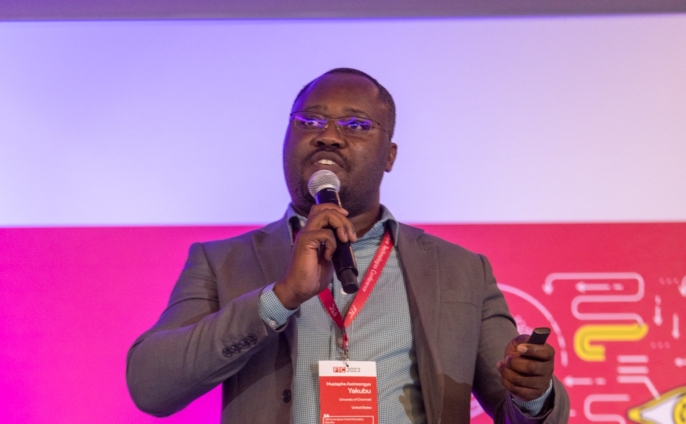A researcher on Information and Communication Technology (ICT), Mustapha Awinsongya Yakubu has called for increased investment in digital devices to empower the country’s security services to fight crime, reduce the effects of conflicts, and empower citizens against the effects of crisis.
Mr. Yakubu, a Doctor of Philosophy (PhD) Candidate at the University of Cincinnati, USA told Myjoyonline.com that the devastating nature of conflicts and their ripple effects on livelihoods required modern and dynamic approaches to help mitigate the impact on lives.
Consequently, he called for a multifaceted approach that would strengthen security measures, foster sustained and inclusive dialogue among all stakeholders, and adopt and implement targeted efforts to tackle the underlying socio-economic and political grievances.
“Without a comprehensive and enduring intervention, the cycle of violence is likely to persist, posing a significant challenge to the region's stability and prosperity,” Mr. Yakubu, whose PhD research focuses on Crisis Informatics and Climate Change Systems, said in an interview.
He was speaking on modern ways of tackling crises and conflicts and their ripple effects on lives and properties in the wake of fresh disturbances in Bawku in the Upper East Region.
The border town in northern Ghana has been infamous for the protracted conflict between the two main ethnic groups, leading to the killing of hundreds and the destruction of properties.
Many inhabitants have also fled the once vibrant municipality as fighting persists.
Mr. Yakubu said the situation was unfortunate and new methods must be introduced to help mitigate the effect on lives while resolving the conflict sustainably.
He mentioned the need for situational awareness and crisis informatics research as they were essential in addressing Bawku's complex and persistent conflict.
“By offering in-depth insights and real-time data, it can significantly inform strategic decision-making. Leveraging situational awareness and technology can contribute to effectively managing and resolving the multifaceted issues in Bawku,” he said.
Once successfully, the I.T. expert said the lessons could then be replicated in other conflict zones and applied in any unplanned disaster across the country.
He said cutting-edge technology can also be employed to create sophisticated early warning systems.
He emphasized that these systems could collate and analyze data from a wide range of sources, such as social media, local reports, and advanced surveillance technologies.
He noted that by processing the diverse information, “systems can effectively detect early signs of escalating tensions within the community.”
“Once identified, the systems promptly issue alerts to relevant authorities and local communities, prompting them to take proactive measures,” Mr. Yakubu said.
“For example, if there are reports of minor confrontations or unusual gatherings, these systems can trigger alerts for increased security patrols or facilitate community meetings aimed at addressing underlying grievances before they spiral into full-scale violence. This proactive approach has proven to be significantly more effective than a reactive response to events after they have already unfolded,” he said.
He said the implementation of advanced surveillance and data-gathering tools could help monitor conflict zones in real-time, enabling proactive measures.
He explained that pattern analysis and predictive modeling could also identify potential flare-ups, while improved communication systems would help to facilitate better coordination among security forces, local authorities, and community leaders.
“Community engagement and reporting through anonymous tools can improve situational awareness. Technology plays a crucial role in response, with surveillance technologies like CCTV, drones, and artificial intelligence (AI)-driven analytics monitoring high-risk areas.
“Also, early warning systems use data from multiple sources to detect signs of escalating tensions, while biometric systems and advanced identification tools at checkpoints help manage movement and neutralize potential threats,” he said.
Mr. Yakubu said big data analytics could provide actionable intelligence, and mobile and web applications for conflict management can enhance personal safety and awareness.
On how to implement for effective outcomes, he advised that stakeholders integrated new technologies with existing infrastructure, train local security forces and community leaders, promote public awareness campaigns, and ensure sustainable funding and support for technological initiatives.
Latest Stories
-
‘Shocking and excessive’ – Lawyer challenges $18m verdict in Anas-Kennedy Agyapong case
9 minutes -
Parliament approves GH₵2.8bn for road maintenance
24 minutes -
Minority Chief Whip raises concerns over ambiguities in Gold Board bill
1 hour -
Mahama warns leaders against ‘decisions that kill’ after debt crisis claims lives
1 hour -
Wisconsin Attorney General sues to block Elon Musk $2m election giveaway
1 hour -
Disney faces US investigation over DEI practices
1 hour -
Hair relaxers linked to increased breast cancer risk in Ghanaian women
2 hours -
Columbia University president resigns amid Trump crackdown
2 hours -
CJ removal petition: Citizens must not sit back and watch politicians to get their way – NPP MP
2 hours -
Thousands gather to bid farewell to ageless Ga music icon Naa Amanua Dodoo
2 hours -
From despair to hope: Khadijah Bawuma receives life-changing scholarship after Myjoyonline report
2 hours -
Mob kills seven suspected kidnappers in Nigeria’s Edo state
3 hours -
Joseph Paintsil to make injury comeback after six weeks out
3 hours -
14 arrested over missing ECG containers at port
4 hours -
Energy Minister demands forensic audit over missing ECG containers
4 hours

